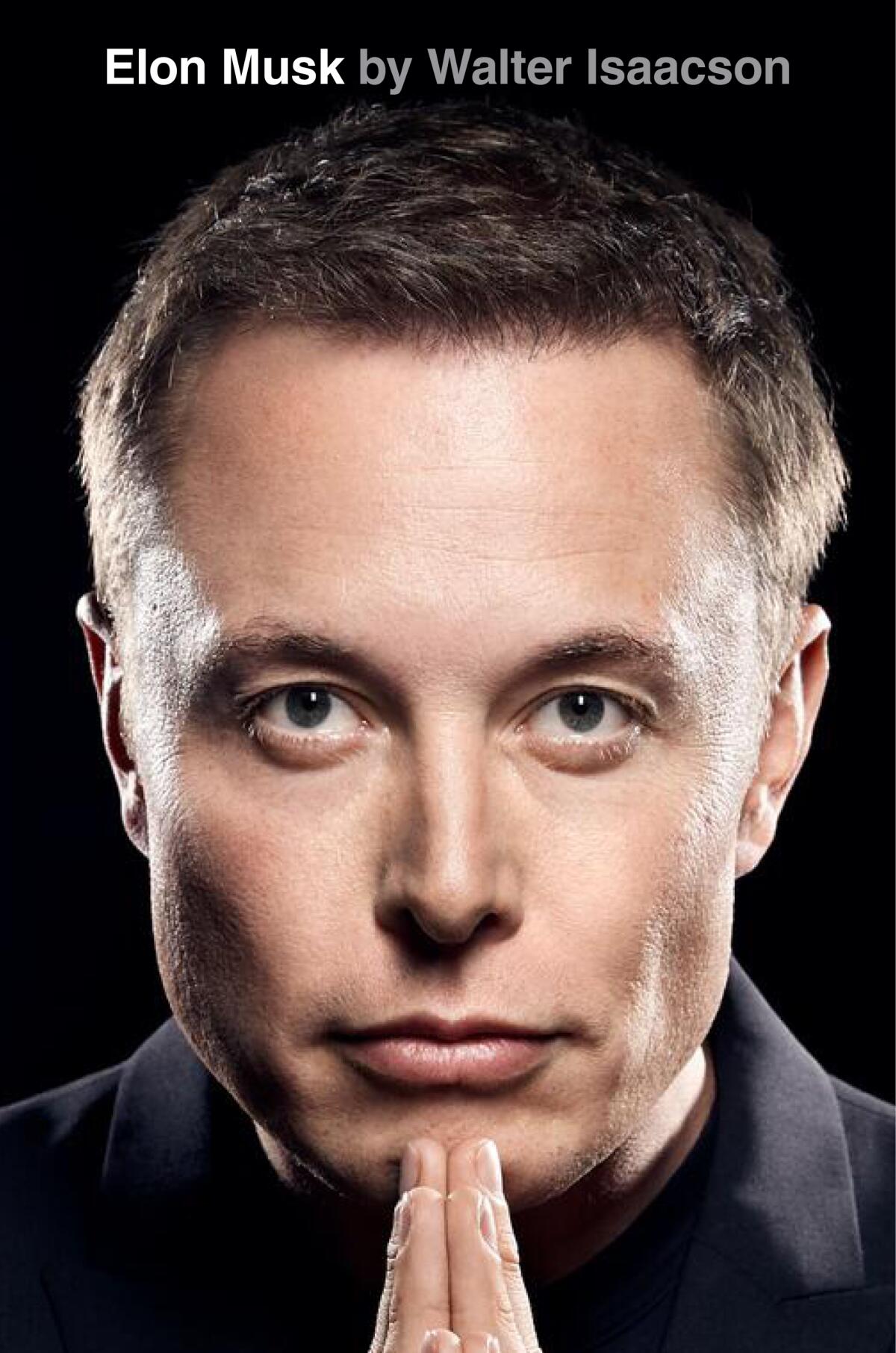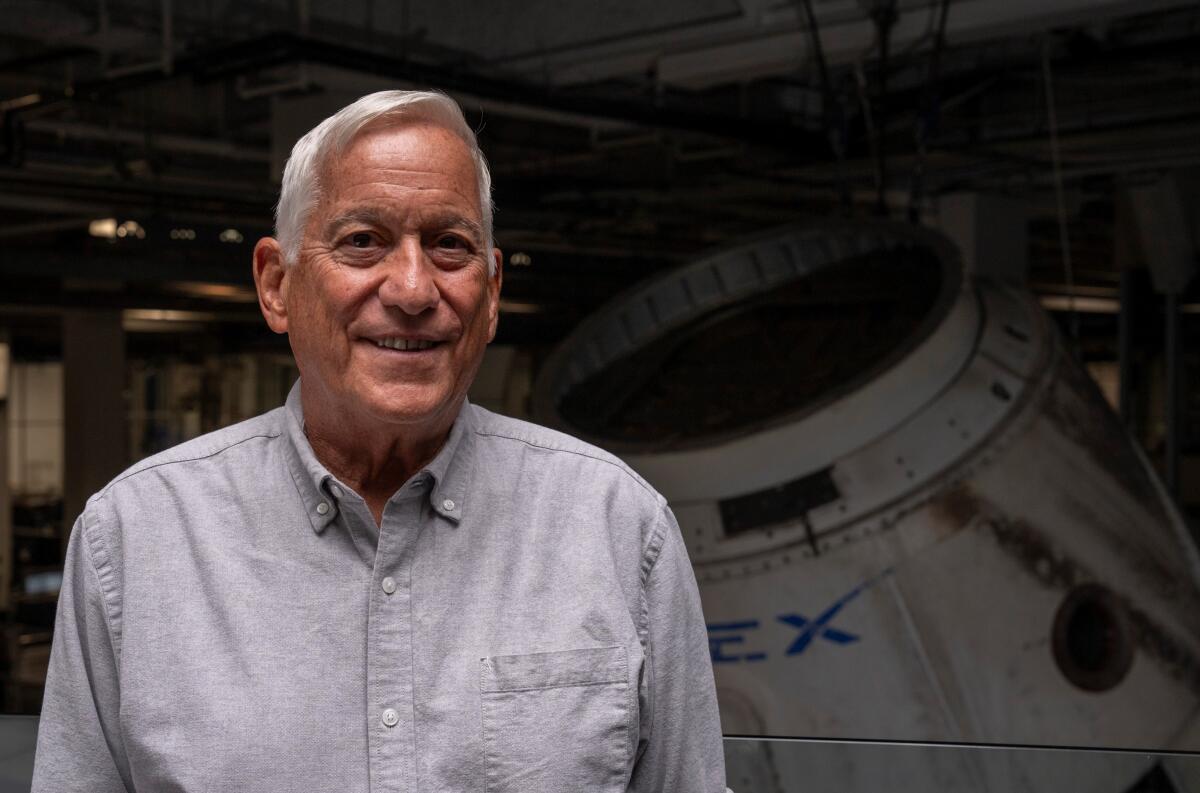Sign up for our Book Club newsletter
Get the latest news, events and more from the Los Angeles Times Book Club, and help us get L.A. reading and talking.
You may occasionally receive promotional content from the Los Angeles Times.

This excerpt is adapted from Walter Isaacson’s biography “Elon Musk,” published this month. Reprinted with permission from Simon & Schuster.
“The coronavirus panic is dumb,” Musk tweeted. It was March 6, 2020, and COVID had just shut down his new factory in Shanghai and begun to spread in the U.S. That was decimating Tesla’s stock price, but it was not just the financial hit that upset Musk. The government-imposed mandates, in China and then California, inflamed his anti-authority streak.
When California issued a stay-at-home order later in March, just when the Fremont factory was starting to produce the Model Y, he became defiant. The factory would remain open. He wrote in a company-wide email, “I’d like to be super clear that if you feel the slightest bit ill or even uncomfortable, please do not feel obligated to come to work,” but then he added, “I will personally be at work. My frank opinion remains that the harm from the coronavirus panic far exceeds that of the virus itself.”
After county officials threatened to force the plant to shut down, Musk filed suit against the orders. “If somebody wants to stay in their house, that’s great,” Musk said. “But to say that they cannot leave their house, and they will be arrested if they do, this is fascist. This is not democratic. This is not freedom. Give people back their goddamn freedom.” He kept the plant open and challenged the county sheriff to make arrests. “I will be on the line with everyone else,” he tweeted. “If anyone is arrested, I ask that it only be me.”

Musk prevailed. The local authorities reached an agreement with Tesla to let the Fremont factory stay open so long as certain mask-wearing and other safety protocols were followed. These were honored mainly in the breach, but the dispute died down, the assembly line churned out cars, and the factory experienced no serious COVID outbreak.
The controversy became a factor in his political evolution. He went from being a fanboy and fundraiser for Barack Obama to railing against progressive Democrats. One Sunday afternoon in May, in the middle of the controversy, he unleashed a cryptic four-word tweet: “Take the red pill.” It was a reference to the 1999 movie “The Matrix,” in which a hacker discovers that he has been living in a computer simulation (a concept that has always intrigued Musk) and is given a choice of taking a blue pill, which will allow him to forget everything and return pleasantly to his life, or a red pill, which will expose him to the real truth of the Matrix. The phrase “Take the red pill” was adopted by many, including some men’s-rights activists and conspiracy theorists, as a rallying cry that signaled willingness to face the truth about secretive elites. Ivanka Trump caught the reference. She retweeted him with the comment “Taken!”
Another obscure tweet that reflected the shift in his politics came in December 2021: “traceroute woke_mind_virus,” it read. “Traceroute” is a networking command to determine the path to the source server of some information. Musk had taken up the cause of battling what he considered to be the excesses of political correctness and the woke culture of progressive social-justice activists. When I asked him why, he responded, “Unless the woke-mind virus, which is fundamentally anti-science, anti-merit, and antihuman in general, is stopped, civilization will never become multiplanetary.”
Musk’s reaction was partly triggered by the decision of his oldest child, Xavier, then sixteen, to transition. “Hey, I’m transgender, and my name is now Jenna,” she texted the wife of Elon’s brother. “Don’t tell my dad.” When Musk found out, he was generally sanguine, but then she became a fervent Marxist and rejected him. His disagreements with Jenna, he says, “became intense when she went beyond socialism to being a full communist and thinking that anyone rich is evil.”

The rift with Jenna, he says, pained him more than anything in his life since the infant death of his firstborn child Nevada. “I’ve made many overtures,” he says, “but she doesn’t want to spend time with me.”
He partly blames what he calls the progressive woke indoctrination that pervaded the Los Angeles private school she attended, Crossroads. When his kids were younger, he sent them to a school that he had created for family and friends called Ad Astra. “They went there until they were about fourteen, but then I thought they should be introduced to the real world for high school,” he says. “What I should have done is extend Ad Astra through high school.”
“He feels he lost a son who changed first and last names and won’t speak to him anymore because of this woke-mind virus,” says Jared Birchall, the manager of his personal office. “He is a firsthand witness on a very personal level of the damaging effect of being indoctrinated by this woke-mind religion.”
L.A. Times Book Club lineup features Elon Musk biographer Walter Isaacson and Christian Cooper, author of ‘Better Living Through Birds.”
Jenna’s anger made Musk sensitive to the backlash against billionaires. He believed that there was nothing wrong with building successful companies and keeping the money invested in them. But by 2020, he had come to feel that it was unproductive and unseemly to cash in those riches and lavish them on personal consumption.
Until then, he had lived rather grandly. His primary residence in the Bel Air section of Los Angeles, which he had bought for $17 million in 2012, was a sixteen-thousand-square-foot faux-palace with seven bedrooms and a guest suite, eleven baths, gym, tennis court, pool, two-story library, screening room, and orchard. It was a place that his five kids could feel was their castle. They would stay with him four days a week and had a routine of tennis lessons, martial arts, and other activities at the house.
When the actor Gene Wilder’s home across the road went on sale, Musk bought it to preserve it. Then he bought three surrounding houses and toyed with tearing down some to build his own dream house. He also owned a $32 million, thirteen-bedroom, forty-seven-acre Mediterranean-style estate in Silicon Valley.
In early 2020, Musk decided to unload them all. “I am selling almost all physical possessions,” he tweeted three days before X was born. “Will own no house.” He explained to Joe Rogan the sentiment that led to that decision. “I think possessions kind of weigh you down and they’re an attack vector,” he said. “In recent years ‘billionaire’ has become pejorative, like that’s a bad thing. They’ll say, ‘Hey, billionaire, you’ve got all this stuff.’ Well, now I don’t have stuff, so what are you going to do?”
His politics also began to shift at this time, partly as a reaction to attacks on him by some Democrats. “Elizabeth Warren actually called me a freeloading grifter who doesn’t pay taxes, when I’m literally paying the most tax of any individual in history,” he says. He was especially infuriated by an attack from a progressive California assemblywoman, Lorena Gonzalez. “F— Elon Musk,” she tweeted. That added to his frustrations with California. “I came there when it was the land of opportunity,” he says. “Now it’s the land of litigation, regulation, and taxation.”
He had developed a deep disdain for Donald Trump, whom he considered a con man, but he wasn’t impressed by Joe Biden. “When he was vice president, I went to a lunch with him in San Francisco where he droned on for an hour and was boring as hell, like one of those dolls where you pull the string and it just says the same mindless phrases over and over.” Nevertheless, he says he would have voted for Biden in 2020, but he decided that going to the polls in California, where he was then registered, was a waste of time because it was not a contested state.
Walter Isaacson is the author of biographies of Elon Musk, Jennifer Doudna, Leonardo da Vinci, Steve Jobs, Albert Einstein, Benjamin Franklin and Henry Kissinger. He teaches history at Tulane and was the editor of Time and the CEO of CNN.
What: Bestselling author Walter Isaacson joins the L.A. Times Book Club to discuss “Elon Musk” with Times columnist Anita Chabria.
When: 2 p.m. Pacific Oct. 1
Where: The El Segundo Performing Arts Center. Get tickets for this in-person event on Eventbrite.
Join: Sign up for the Book Club newsletter for the latest books, news and live events.
Sign up for our Book Club newsletter
Get the latest news, events and more from the Los Angeles Times Book Club, and help us get L.A. reading and talking.
You may occasionally receive promotional content from the Los Angeles Times.